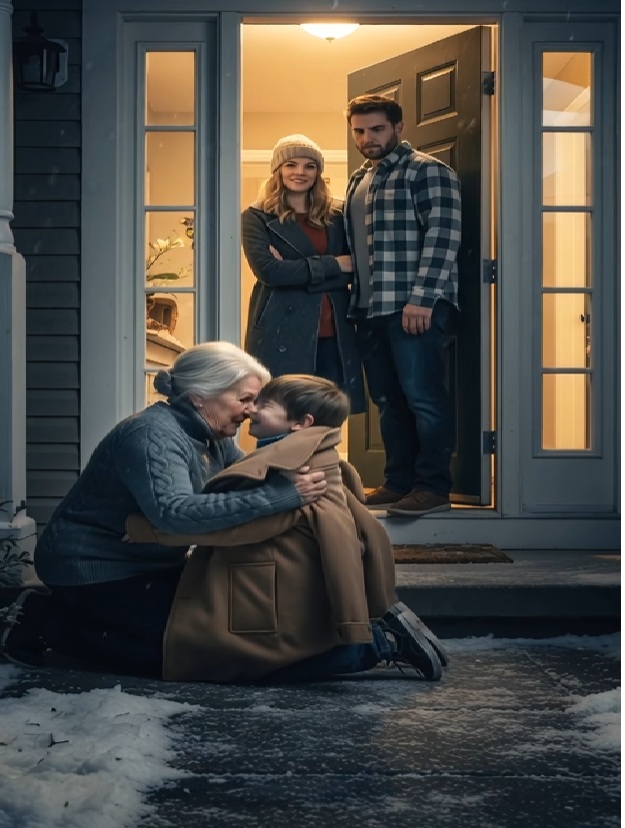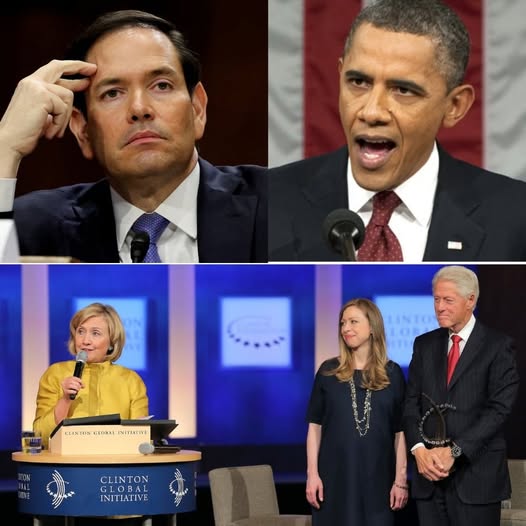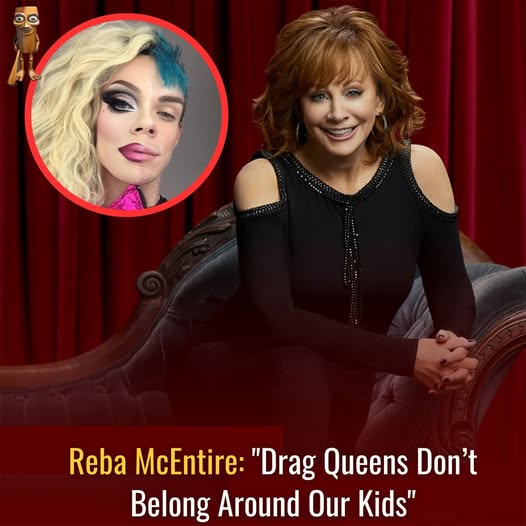My daughter-in-law left my grandson alone in the snow. Through tears, he told me, “She told me to wait while she spent time with her new boyfriend.” I took him home. The next day, after reading my letter, she understood—she had 24 hours to vacate.
It was just before 8 p.m. on a quiet Tuesday in February. Snow had been falling for hours, blanketing everything in silence. The call came from my son David’s number, but the voice on the line wasn’t his.
“Mrs. Kinley? This is Janet from next door. I think you need to come here. Now.”
I started shaking before she even said why. She’d found my six-year-old grandson, Luke, sitting on the front porch—alone, locked out, coatless in the middle of a snowstorm. I didn’t stop for a bag. Didn’t change out of my slippers. Just threw on boots and made the ten-minute drive faster than I had in years, heart pounding the whole way.
When I pulled into their driveway, I saw him. A tiny figure wrapped in Janet’s oversized coat, teeth chattering. As soon as he saw me, he ran. “Grandma!”
I held him close, his little body shaking in my arms. He was ice cold. “Oh, sweetheart,” I murmured, trying to hold back tears. “Where’s your dad?”
His eyes—David’s eyes—looked up at me, wide and broken. “Melissa told me to wait outside while she was with the new daddy. She said I was being too noisy.”
New daddy. The words chilled me to the core. David had only been married to Melissa for eight months.
“How long were you outside, love?” I asked, checking his freezing fingers.
“I don’t know. It was still daytime when she made me sit out here.”
Janet and I exchanged horrified looks. That meant he’d been out there for at least three hours—in the middle of a Pennsylvania snowstorm.
I banged on their front door until it finally opened. Melissa stood there in a silk robe, unbothered. Behind her, David was coming downstairs, buttoning his shirt.
“Oh,” Melissa said flatly, barely glancing at Luke. “So you found him.”
“Found him?” I snapped, my voice shaking. “Why was my grandson outside, freezing?”
She shrugged, cool and dismissive. “He was interrupting. David and I needed privacy.”
I waited for David to be shocked, to step in. But he only looked irritated. “Mom, why are you here?”
“Because your neighbor had to call me after finding your child half-frozen! David—he could have died!”
Melissa rolled her eyes. “You’re being dramatic. It’s not that cold.”
I looked at Luke’s blue lips and thin sweater. “I’m taking him with me,” I said. And I meant it.
As I buckled him into my car, he whispered, terrified, “Grandma, this happens a lot. When she wants alone time with Daddy, she puts me in the basement instead.”
I went cold. “She says Daddy doesn’t want me around anymore since he has her.”
This wasn’t a one-off. It was abuse. My son was either oblivious—or involved.
That night, after Luke was warm and safe, fast asleep clutching his stuffed elephant, I wrote the letter. The house they were living in—my house—had been left to me by my late husband. I had let David live there, never expecting it would become a place of cruelty. I thought I was helping my son. Instead, I had enabled something unforgivable.
For over sixty years, I’d been the kind, agreeable one. But seeing my grandson shivering on a porch broke something open in me. The nice grandma was gone. In her place stood a protector.
At 9 a.m. sharp the next morning, I handed David a sealed envelope.
“This is for both of you,” I said.
Melissa appeared behind him in her designer leggings, already annoyed. “This is unnecessary drama, Eleanor. Luke is fine. Kids bounce back.”
“Is that what you call locking a six-year-old in basements and sending him out in the cold?” I said, my voice low.
David went pale as he read. I had spelled it all out—neglect, emotional abuse, witness accounts. I gave her 24 hours to leave or face formal charges.
“But this house belongs to us now,” David tried.
“No,” I said. “Check the deed. It’s still in my name. Always has been.”
Melissa’s confidence crumbled. She hadn’t checked the paperwork.
“Luke stays with me. You have until tomorrow.”
I walked away, leaving them speechless.
That day, I spoke with his teacher. She said she’d been quietly feeding Luke at school—Melissa often “forgot” his lunch. The family doctor confirmed he was underweight and showed signs of long-term stress.
That night, David called. “Melissa’s furious. She thinks you’re trying to ruin our marriage.”
“I’m trying to save your son,” I said.
Then he dropped the bombshell: “She’s pregnant.”
Of course she was. Suddenly, everything made sense. Luke wasn’t just inconvenient—he was in the way.
“She’s planning to replace him,” I said. “And you’re letting her.”
“She wouldn’t—” he began, then stopped.
“She locked him in the cold, David. What wouldn’t she do?”
There was silence. Then, “What do you want me to do?”
“Choose your son,” I said. And I hung up.
Twenty-four hours passed. No word. I called my lawyer. I had records, photos, testimony.
“It’ll be messy,” he warned.
“It’s already a mess,” I replied.
That night, David asked to visit Luke. When he arrived, I watched something shift in him. For the first time in months, he really saw his son. They played with LEGOs. Luke lit up.
After putting him to bed, David sat down, hollowed out. “She told me he lies. That he acts out. But… tonight he just seemed like a kid who misses his dad.”
“He’s always been that kid,” I said. “You just weren’t looking.”
He confessed Melissa’s manipulation. How she painted every abusive act as discipline. How she made him think Luke was the problem.
“You have to choose,” I said again.
He left without saying more, but I could see it—he’d finally seen the truth.
On Monday, the call came. Melissa’s voice was razor sharp.
“Eleanor, we’re coming tonight. We’re taking Luke home.”
I called a locksmith.
When they arrived, Melissa stormed in. “We’re taking him. This is over.”
“Actually,” I said calmly, “the locks have been changed. Your things are packed and ready to be picked up.”
“You can’t do that!” she shouted.
“I just did.”
David looked panicked. “Mom, where are we supposed to go?”
“You have choices. But not here. Not while this boy is at risk.”
Then I turned to Luke. “Sweetheart, has Melissa ever told you your dad didn’t want you around anymore?”
Melissa started to speak, but David stopped her.
Luke stared at the ground. “She said Daddy was tired of me. That when the baby comes, there won’t be space for me.”
Silence.
David turned to Melissa. “Get out. Get out of this house. Out of our lives.”
She left, swearing revenge. David sat down, shattered. “I’m sorry, Mom.”
“Tell him,” I said.
The custody fight was brutal. Melissa tried to paint me as manipulative, David as spineless. But we had the truth—doctor’s reports, neighbor statements, and a quiet sentence from Luke’s teacher:
“Kids don’t lie about being afraid.”
We won. David got full custody. Melissa faded away, giving birth to a child Luke may never meet.
A year later, our house is full of laughter. Luke’s drawings cover the fridge. David is in therapy. He’s dating someone kind—a teacher who adores Luke.
Sometimes I think back to that snowy night. It ended the version of me who kept the peace at all costs. In her place stands someone fierce.
I didn’t just fight for my grandson.
I saved him.
And in the process, I saved my son.
And myself.
We are fewer now. But we are stronger.
Built not on comfort.
But on love.



